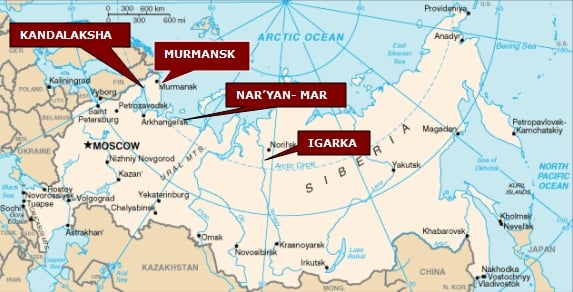Just a few weeks ago, the Russian National Security Council announced its Arctic strategy for the next decade. A good portion of the policy plan is dedicated to the need to facilitate sea transportation via the integration of the Northern Sea Route. Absent from the document, however, was a plan for rebuilding Russia’s ailing sea ports. Frail infrastructure has long been a weak point of Russia’s, so it comes as little surprise that the ports in the High North have fallen by the wayside.
To combat this problem, the Russian Border Agency (Rosengranitsa) has announced that it wants to modernize Russia’s Arctic ports in Murmansk, Kandalaksha, Igarka and Nar’yan-Mar (official announcement here, in Russian). The agency claims that upgrades and improvements are necessary given the increase in circumpolar oil and gas prospecting and foreign companies’ interest in Russia’s Arctic shelf. Better ports, customs facilities, and marine checkpoints would allow Russia to make sure it collects all due levies – an important point, since Russia seeks to run the Northern Sea Route as a national, not international, shipping lane. More modern ports would also be more attractive to shipping companies as trans-Arctic maritime transportation increases over the next several decades.

A plan to improve the nation’s ports seems to be one of the few good ideas to come out of the Russian government in terms of infrastructure in a long time. You may have recently seen the New York Times feature story about Russia’s plan to build a two-mile long suspension bridge between Vladivostok and tiny Russki Island, which the author dubbed a “bridge to nowhere.” The bridge, which will cost $1 billion, is part of a larger $6 billion plan to revitalize the economy in Vladivostok and the Russian Far East. But while prospects for the economy in this far-off part of Russia are still dim, at least in the Arctic, there is more potential for investments to pay off. The price of gas and oil will eventually increase, while melting ice will open up Arctic shipping lanes. On the other hand, in the Russian Far East, there will be a one-time APEC Summit in 2012.
News Links
“Border Agency Wants Better Arctic Ports,” Barents Observer